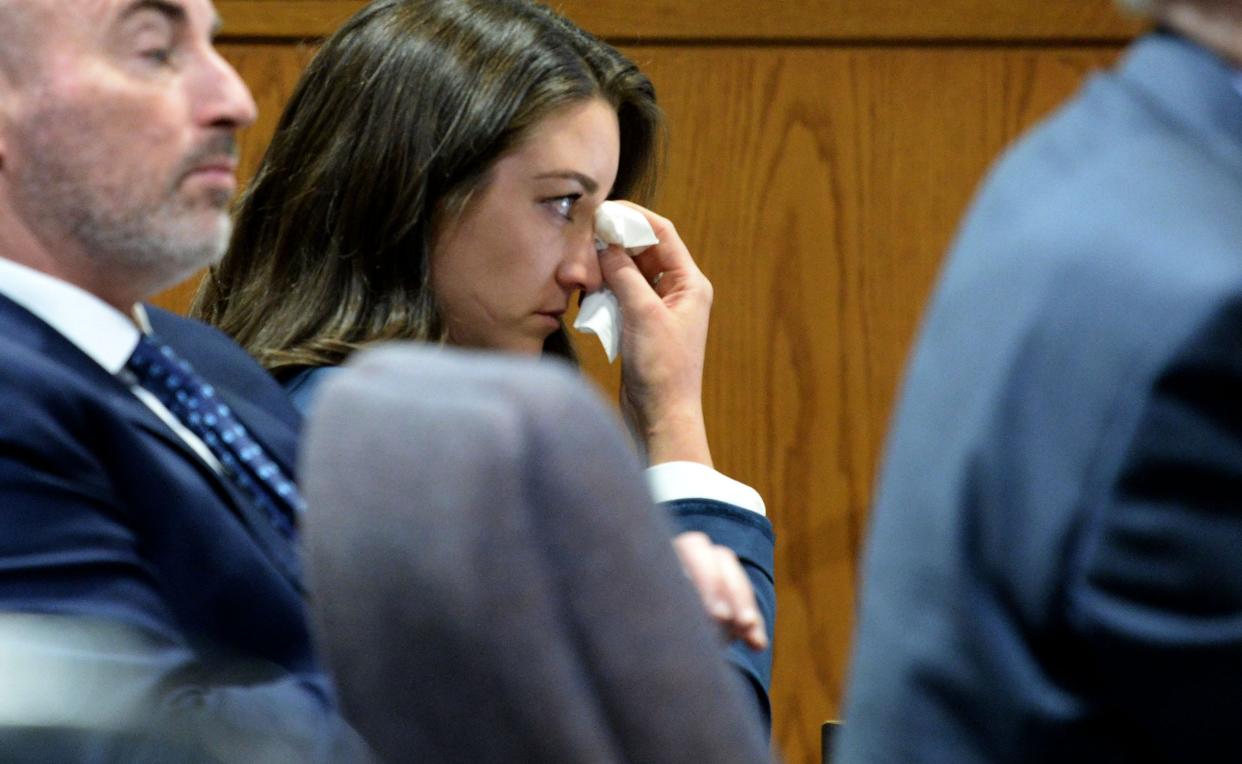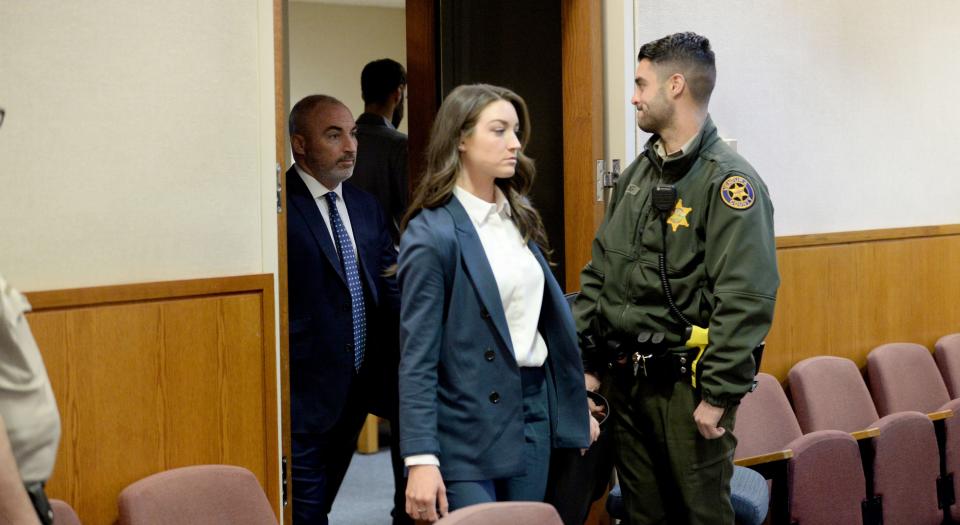Bryn Spejcher testifies she 'went black' on cannabis before fatally stabbing man she was dating

Editor’s note: This story contains graphic descriptions of violence and psychosis that may be disturbing to some readers.
Bryn Spejcher has told the story of the night she killed Chad O’Melia to a long list of police detectives, attorneys, therapists, doctors and forensic experts over the past five and a half years. On Tuesday, she told it to the jury that will soon decide whether she is guilty of involuntary manslaughter.
Spejcher chose to testify in her own defense and was the last witness called by her attorneys. The trial’s closing arguments are scheduled for Thursday, and the jury will begin deliberations either Friday or Monday in Ventura County Superior Court.
Spejcher was originally charged with murder. Prosecutors reduced the charge to involuntary manslaughter after their own expert psychologist agreed with defense experts that Spejcher was suffering from cannabis-induced psychosis when she stabbed O’Melia to death at his Thousand Oaks condominium in 2018.
They had been dating for a few weeks at the time. She was 27, and he was 26.
A murder charge would mean Spejcher intended to kill O’Melia, and multiple experts who examined her testified that she lacked the capacity to form that intent. Involuntary manslaughter means she was criminally responsible for his death but didn’t intend to kill him. In California, it typically carries a prison sentence of up to four years, though Spejcher is charged with enhancements that could increase a potential sentence if she is convicted.
On Tuesday, Spejcher gave a detailed description of the night of May 27, 2018, and the early morning hours of May 28, when she killed O’Melia. After smoking marijuana from O’Melia’s bong that night, Spejcher began to hallucinate. She described her symptoms and hallucinations vividly in her testimony, but said her memories “went black” at the point when she first stabbed O’Melia with a large kitchen knife.
She also said O’Melia pressured her to smoke the weed, which is a key point in the trial. Spejcher’s defense revolves around the idea that she was “involuntarily intoxicated,” which in a legal context could mean she was coerced into consuming the drug or didn’t know what she was taking, or that she could not have foreseen the drug could trigger a psychotic episode.
In her cross-examination of Spejcher, prosecutor Audry Nafziger portrayed Spejcher as someone who “enjoyed getting intoxicated” and had more than a passing familiarity with cannabis. Nafziger read Spejcher’s text messages with her friends from 2018 that talked about getting drunk many times, missing a morning of work due to a hangover and eating edible forms of cannabis. Nafziger also questioned Spejcher’s assertion that O’Melia pressured her to smoke weed, pointing out that she didn’t mention any pressure or intimidation in most of her previous retellings of the story to police detectives and doctors.

Spejcher replied that she often exaggerated her intoxication in those texts and was never too drunk to know what she was doing or to compose coherent text messages. She said she was late for work only twice at UCLA Health, once with the hangover and once when her car was broken into and her hearing aids were stolen. She also said she didn’t mention the alleged pressure every time because she’d been interviewed repeatedly and figured the police knew everything they wanted to know.
Teary testimony
Spejcher was on the witness stand for nearly three and a half hours Tuesday. At the beginning, she told her attorney, Robert Schwartz, that she was “nervous, trembling, nauseous.” She cried during much of her testimony, and broke down sobbing a few times when she was asked about the details of her psychotic episode and of O’Melia’s death, and when she was shown photos of herself in the hospital in the days after.
Spejcher stabbed herself in the neck with an 8-inch serrated bread knife after she killed O’Melia. Her wounds required surgery and left scars that are still visible on her face and neck. She also had deep cuts on her right hand, and her left hand was broken, likely when a police officer struck her nine times with a retractable steel baton to make her drop the knife.
Spejcher told much of her life story on the witness stand, starting with her childhood in a Chicago suburb. She was born with lung problems and suffered serious hearing loss shortly after birth, likely due to side effects of drugs and surgery, according to testimony from her mother, who was on the stand before Spejcher.
Spejcher said she has worn hearing aids since she was 4 years old and also reads lips. During the trial, she has had a monitor in front of her with a live feed of the court reporter’s notes. The monitor was set up for her at the witness stand.
Spejcher grew up as the only child with a hearing loss in most of her schools. She said she felt “isolated, ashamed, embarrassed.”
“I just tried to hide my hearing aids and focus on what everyone else was doing in school, which was sports, music, academics,” she said.
While in college, she decided she wanted to become an audiologist and help other people with hearing loss. She was accepted to the Washington University School of Medicine in St. Louis, where she earned a doctorate in audiology. One of her professors testified Monday that he taught about 1,000 graduate students in his career, “and none has ever been better than Bryn Spejcher.”
In August 2017, Spejcher moved to Thousand Oaks and started a job as an audiologist at a UCLA Health clinic.
“I loved working there and getting to know the patients,” she said in court. “It was very easy for me to be sympathetic with them or share my experiences with them…to relate to them and make them feel like they’re not alone.”
'He was really nice to me'
Specjher’s first home in Thousand Oaks didn’t allow pets, so she had to leave her dog back in Illinois with her family. In April 2018, she started renting a room in a house where she could have Arya, her Siberian husky. She’d had the dog about two years and had trained it to be a hearing service dog, alerting her when the doorbell rang or when a car was approaching.
Specjher started taking Arya to Conejo Creek Dog Park in Thousand Oaks. In late April, she met O’Melia there. He was with his German shepherd, Athena.
Spejcher testified that O’Melia asked for her number the first few times they ran into each other at the dog park and she said no. But he gave her his business card and she texted him. One day, they shared “a tiny bottle” of Irish whiskey at the dog park, Spejcher said.
“I thought he was very funny,” she said. “He was really nice to me. We were always sarcastic with each other. He ended up being a really nice, funny person when I got to know him.”

Spejcher got to know O’Melia’s roommates and spent the night at their condominium a few times. On the weekend before O’Melia’s death, Spejcher and a few other friends came over for drinks. Spejcher testified that on that night, she had a few bottles of Smirnoff Ice and smoked for the first time out of O’Melia’s bong.
O’Melia was a regular pot smoker, while Spejcher testified she didn’t like smoking and had consumed cannabis only around eight times in her life. Only once, the first time, had she gotten noticeably high from it. She had shared a joint with her then-boyfriend on a camping trip and got the giggles and the munchies.
On the Sunday of Memorial Day weekend in 2018, Specjher and Arya had been in Carpinteria with friends. O’Melia invited her over in the evening and she testified that she got to his condo around 10:30 p.m.
They hung out and chatted with each other and one of O’Melia’s roommates. After midnight, O’Melia went to the patio to smoke from his bong, and Specjher joined him.
She testified that she asked him for a hit from the bong. He prepared it for her and she inhaled. All she felt, she said in court, was “burning and coughing.”
They chatted for about 15 more minutes and she told him about her experiences with cannabis and how it never did much for her.
“He acted kind of surprised,” Spejcher said. “I don’t remember his exact words, but he said something like, ‘Let’s make this more intense for you,’ or more f---ed up.”
O’Melia put more weed in the bong and this time he filled it with much more smoke than before, Spejcher testified.
“He got up from his chair and turned the bong toward my face, rushed it to my face and was pressuring me, ‘Hurry up, hurry up, you’ve got to inhale,’” she said. “It all happened so fast. I felt like I couldn’t say no, and I inhaled out of the bong.”
She told her attorney that O’Melia didn’t grab her or use any physical force, but that she’d seen flashes of his temper before and felt “actually kind of scared.”
In a note she wrote for police detectives when she was in the hospital, Spejcher said she told O’Melia she didn’t want any more and he “made” her smoke again.
Later on Tuesday, during her cross-examination, Nafziger disputed that point. Nafziger said Spejcher never again mentioned O’Melia making her do anything in any of her interviews with police or doctors. Nafziger also referred to a recorded interview with police in which Spejcher said she wished O’Melia had hit her before she stabbed him.

“He didn’t hit you even then. …You weren’t afraid of Chad,” Nafziger said.
In her earlier testimony, Spejcher said she began to feel unwell immediately after the second bong hit. She coughed uncontrollably, went to the bathroom to throw up and staggered to the couch after that, the room spinning.
'Then it went black'
The jury had heard numerous descriptions throughout the trial of Spejcher’s psychosis, but Tuesday they heard it from Spejcher herself. She described a feeling of déjà vu, thinking she and O’Melia were having the same conversation over and over. She said she was unable to “form logical words and sentences.” She laid on the couch with her eyes closed and began to hear and see things that weren’t there, in a “cycle” that felt like it went on for hours.
Spejcher said she thought she was dead. At first she was “stuck in a dead body,” and heard people crying over her and felt hands touching her. Then she had an “out-of-body experience” and saw her dead body on the couch from above, with O’Melia crying and paramedics trying to save her.
In her testimony, Spejcher said she remembers what happened next as if it happened to someone else. She described her actions as something she was watching on a screen, like a movie shot from the point of view of its protagonist. She saw her own hands pushing over chairs and picking up two knives from the kitchen knife block. She threw them at O’Melia and then picked up two more knives.
She said she saw “a brown dog” and her own hand stab the dog, and heard O’Melia yell, “Why did you stab my dog?” The dog was actually hers; Arya survived that wound, but died last year after she got outside and was presumably hit by a car, Spejcher said.
Spejcher testified that after she stabbed Arya, she saw herself advancing on O’Melia.
“I saw the knife in my left hand penetrate Chad’s abdomen area, and then it went black,” she said, crying.
After that she remembers hearing voices saying things like, “Keep going, don’t stop, you’re almost there, you can do this.” She saw O’Melia on the floor, bleeding, and heard someone yell, “Bryn, what are you doing?” It was O’Melia’s roommate coming down the stairs. He ran back up for his phone, ran outside and called 911, according to his testimony earlier in the trial.
She kept hearing voices, this time from what sounded like emergency room doctors and her family members, trying to wake her up. She started screaming for her family.
“As the screaming would be more intense, the vision was starting to lighten up, like I was coming back to life,” she testified. “I saw my hand grab the knife and point it toward my throat, then it went black. I felt like 100 bullets going through my throat, and the harder that was happening, the more the light would show I was about to come back alive.”
Then she felt two shocks that she thought meant someone was bringing her back to life with a defibrillator. By that time, the police had arrived, and an officer was shocking Spejcher repeatedly with a Taser. Spejcher said she blacked out completely and doesn’t remember anything else until she woke up in the hospital.
When she woke up, she didn’t know what had happened to her or O’Melia, or how much of what she remembered was real. She asked a police detective if O’Melia was alive, but wasn't told that he was dead until a day or two later.
Tony Biasotti is an investigative and watchdog reporter for the Ventura County Star. Reach him at tbiasotti@vcstar.com. This story was made possible by a grant from the Ventura County Community Foundation's Fund to Support Local Journalism.
This article originally appeared on Ventura County Star: Bryn Spejcher testifies how cannabis led her to kill Chad O’Melia

